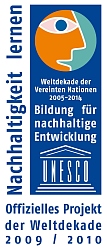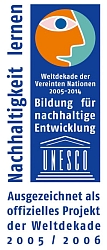Education for Sustainable Development
My approach to education has been acknowledged by the German UNESCO Commission, through their recognition of two projects that I co-initiated as official ‘decade projects’ for the UN Decade of Education for Sustainable Development. About my approach:
In the industrial age, attention has been primarily directed towards what is technologically possible, what is useful, or what can be sold. Consequently, almost the only potentials that are truly nurtured in human beings in industrial civilisations are the cognitive, rational and rationalisable ones. According to the project of modernity, human deficits are compensated for by technical efficiency. The capacity of people to act humanely, however, does not fit easily into such categories. It seems that humaneness is typically viewed as something that can be taken for granted; something available in such vast quantities as the resources of the natural environment. In fact, humaneness is acutely endangered and threatened - just like the earth (humus), it is becoming ever more scarce.
Unfortunately, not only in the industrial value system, but also in the context of sustainability approaches, people tend to operate with an incomplete understanding of the human being. It is the defects and needs of human beings that are often emphasised, overlooking the human capacity to evolve and grow inwardly.
With this in mind, we might ask ourselves: have the ways of life that we presently practice, whether individually or as societies, whether in the global north or as a world community, really arrived at the peak of their potential? As the species responsible for the continuing steady degradation of the earth, are we not also obliged to reverse these developments, and seek out other ways of living?
A truly sustainable society will radically enhance the status of human development. It will place the development of humaneness, in a lifelong process that begins with each and every child child, as its highest priority.


